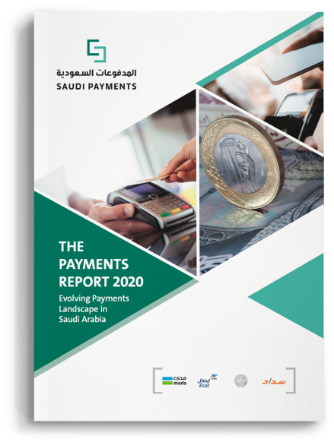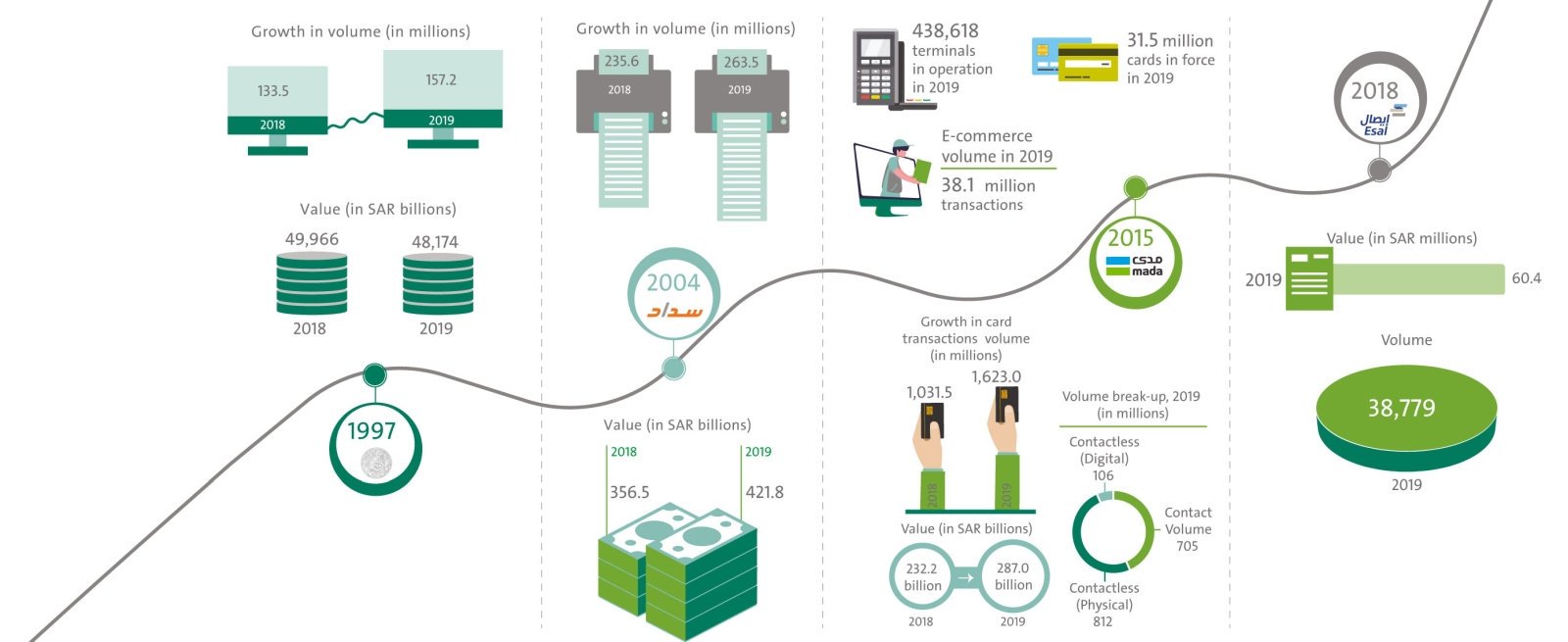
The Payments Report 2020
Evolving payments landscape in Saudi Arabia
The need for continuing SAMAs' journey in developing shared infrastructure for the market was the impetus behind SAMA's 2019 decision to create Saudi Payments, a wholly-owned subsidiary, and payments' arm. The objective was to provide fast, efficient payments and to empower a broader digital payments scenario. How? By developing the necessary back-end infrastructure and enablers for consumers, merchants, corporates, and businesses. Saudi Payments has become a catalyst that is turning the region into an innovator as it swiftly builds a robust national payment infrastructure to unify the Kingdom's digital payment systems. And results are quantifiable – as per a study by SAMA, as of June 2019, cashless payments account for more than 36% of consumer payments and 44% of all payment types, by volume, in Saudi Arabia. With a significant rise in digital payments, greater transparency, and mitigation of shadow economies, we also expect socio-economic benefits as the result of job creation, a proliferation of diverse industries, reduced corruption, and economic growth. The Payments Report 2020: Evolving Payments Landscape in Saudi Arabia explains SAMA's enabling regulatory approach and how it dovetails with the flexible Saudi Payments' infrastructure to accelerate the Kingdom's overarching payments ecosystem.
- Section I Enabling the future with payments regulatory framework
- Section II Payments landscape through the numbers
- Section III Evolving payments landscape in Saudi Arabia
Enabling the future with payments regulatory framework
Saudi Payments has worked together with multiple industry stakeholders to develop a cohesive national payment system and reliable infrastructure to benefit the whole economy. SAMA steadily rolled out products over the past two decades, and now Saudi Payments operates the back-end infrastructure of four platforms (mada, SADAD, SARIE, and Esal) to create parity among market players.
New-age solutions are in the pipeline as Saudi Payments fosters a high-productivity ecosystem. For insights about KSA regulatory initiatives and payments industry measures, please refer Section I: Enabling the future with payments regulatory framework.

Growth of worldwide non-cash transactions (CAGR), by country, 2015–2019e
In line with the changing regulatory measures, digital payments and online transactions are gaining ground in the Kingdom of Saudi Arabia. Between 2015 and 2019, the Kingdom tallied a 35.7% CAGR in cashless payments transaction volume, which is quite high when compared with many individual G20 member countries, the Nordics, and GCC countries.
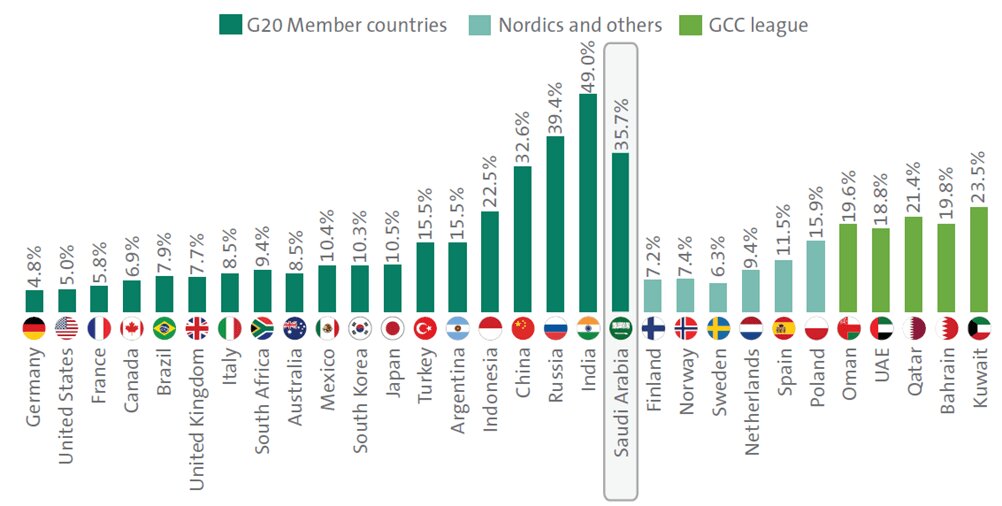 Zoom in
Zoom in
Snapshot of Saudi Payments portfolio enabling the payments growth
Saudi Payments concepts for promoting innovation in Saudi Arabia
Saudi Payments is building a conducive environment in which all industry participants and stakeholders can prosper.
 Zoom in
Zoom in
A pipeline of innovative products and initiatives
Saudi Payments is developing several future product releases and actions that align with Saudi Payments’ 2020–2022 objectives encompassing security, innovation, accessibility, interoperability, and efficiency. Forward-looking initiatives such as an instant payment system (IPS), QR code-based payments, interoperability standards, portals for onboarding wallet players, and a virtual layer facilitating interconnection are among various solutions in the works.
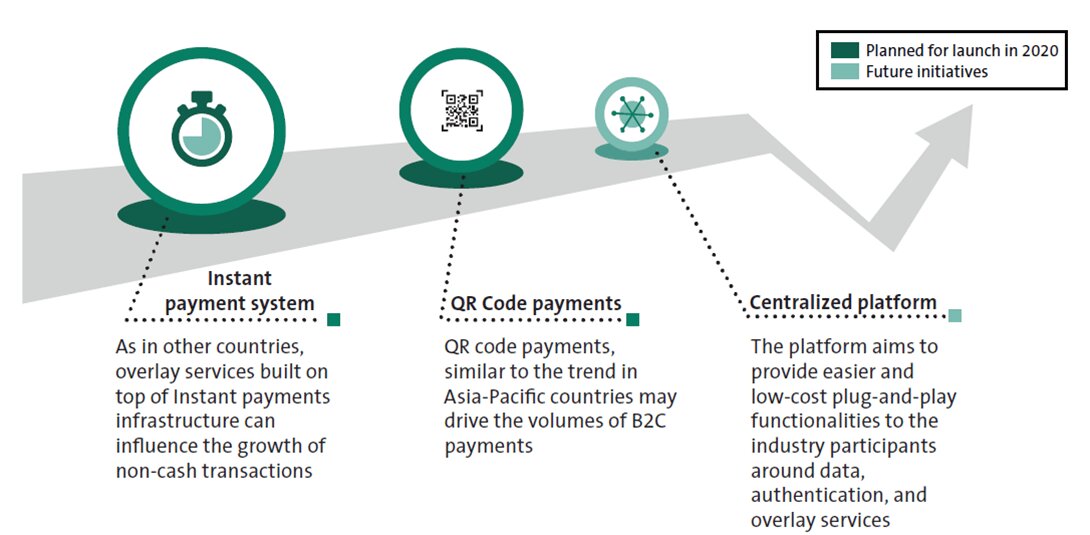 Zoom in
Zoom in
Payments landscape through the numbers
Every country is unique and has individualized ways to transform its payments system. However, all share these tangible benefits of a more digital economy: better consumer convenience, efficient governance, higher business productivity and greater mainstream financial inclusion for all citizens.
In pursuit of these benefits, Saudi Arabia is fostering innovation and modernizing the nation’s payments infrastructure. Proactive efforts by Saudi Payments have been visible in industry growth across segments: PoS transactions, merchant adoption, growth in digital wallets, a rise in online payments, and in many more fronts in digital payments. Read about market trends and analysis in Section II: Payments landscape through the numbers.
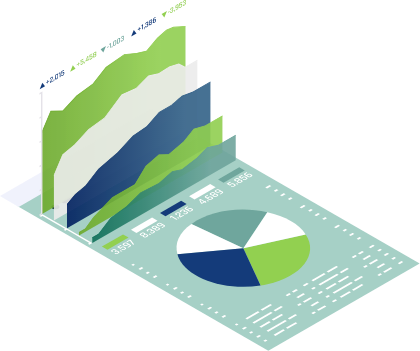
Consumer survey on payment methods usage among age group
According to Voice of Consumer survey findings, both Generation Z and millennials in Saudi Arabia frequently use credit cards, debit cards and mobile payments. For all age groups, mada cards are the most popular cashless payment platform, with 55% of millennials and 38% of Generation Z using them. They are also frequently utilized by older Gen X (68%) and Baby boomers (62%). Credit cards are most popular with Gen X and millennials, and only slightly less among Baby boomers and Generation Z. Mobile payments are also commonly used by these demographic groups. Millennials mostly prefer advanced solutions, such as mobile payments systems (54%) and QR code-based e-wallets (24%).
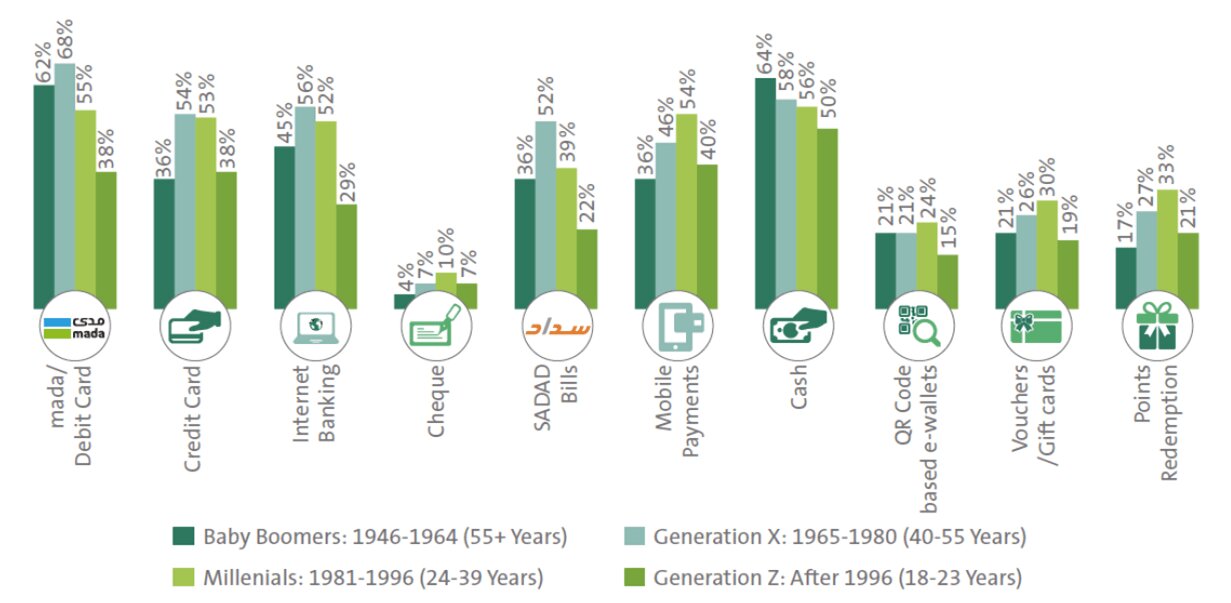 Zoom in
Zoom in
mada e-commerce, by sector, 2019
mada e-commerce payment volumes suggest that telecom retailers / utilities sector currently account for the largest share of e-commerce payments by volume and value. While restaurants are ranked the second-largest by volume of e-commerce payments, their value per payment is smaller than that of other categories.
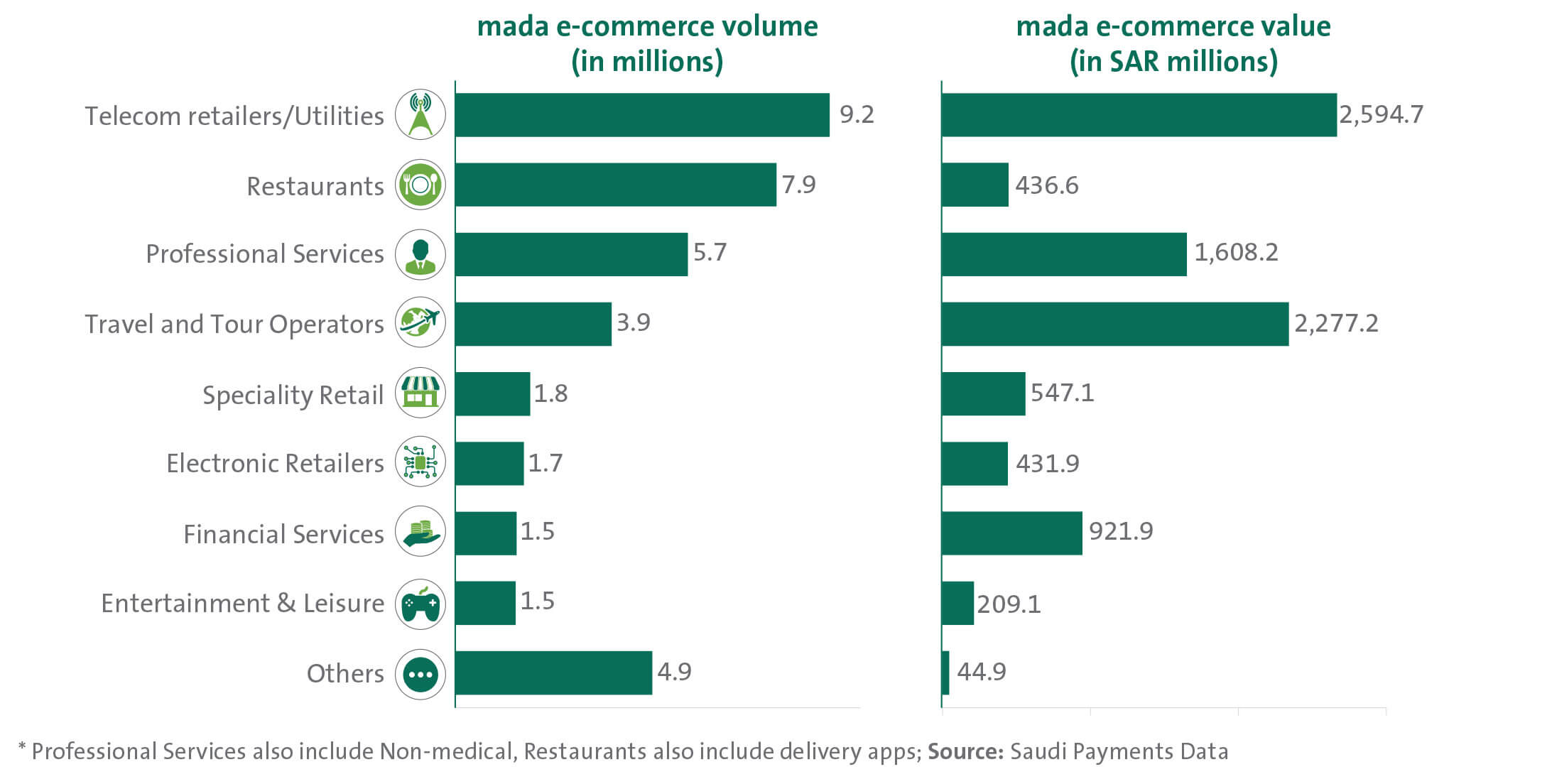 Zoom in
Zoom in
Growth in the number of NFC-enabled PoS terminals and cards in force, 2017–2019
The growing number of PoS terminals at retail outlets – especially at gas stations, pit shops, restaurants, and convenience stores – has significantly boosted digital payments in Saudi Arabia. The number of NFC-based PoS terminals in the country increased at a CAGR of 61% from 2017–2019.
 Zoom in
Zoom in
Payment method preferences based on value segments
Saudi consumers indicated cash as the preferred payment method for low-value transactions, with 29% of respondents favoring it over other payment modes in this category. However, for medium or high-value transactions, customers indicated cashless payment methods, specifically mada cards, as the preferred payment option. Online banking also emerged as one of the most preferred payment methods for high-value transactions. Preference for cashless methods for high-value transactions reflects customers growing trust in the cashless payment systems.
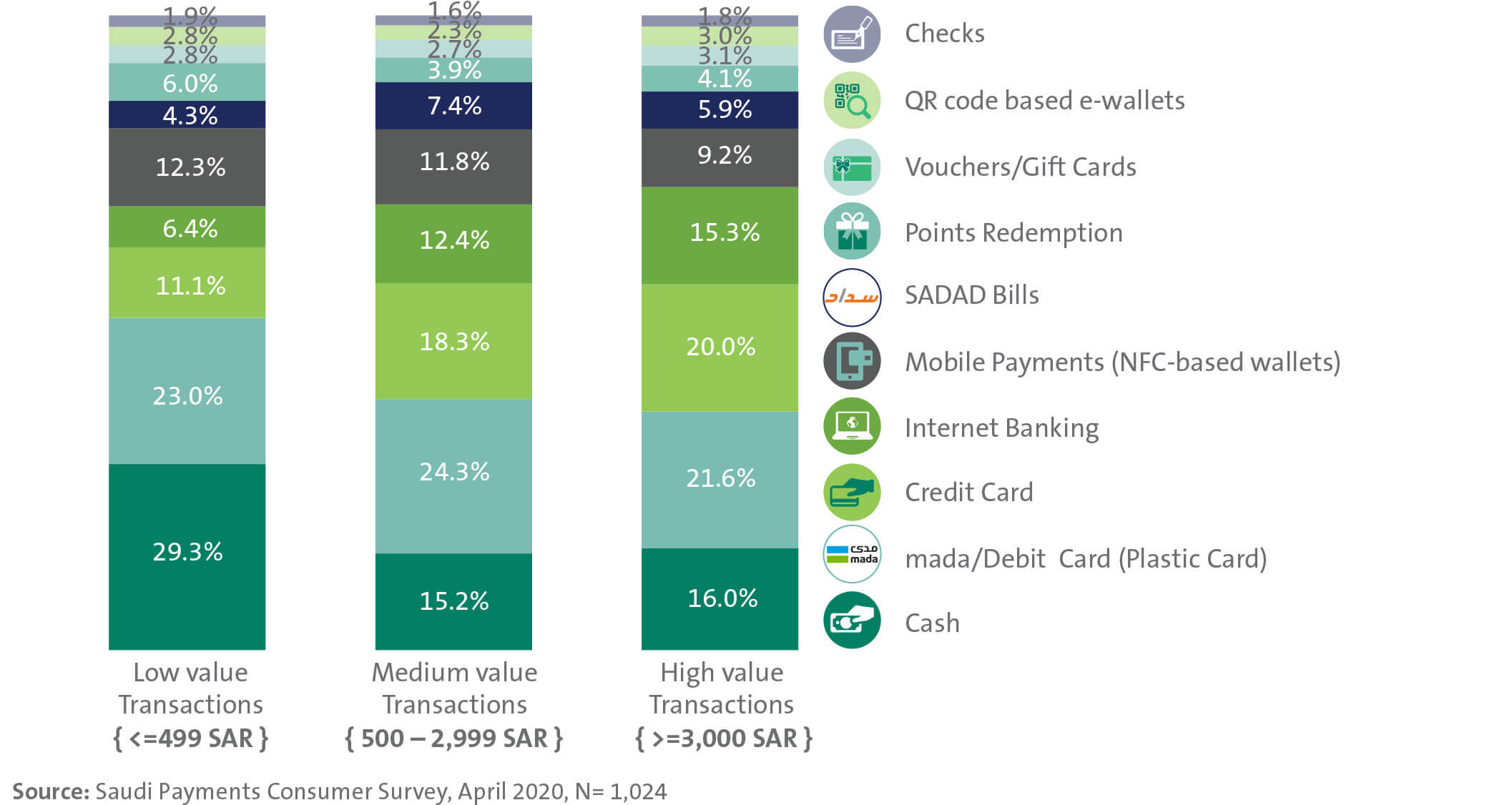 Zoom in
Zoom in
Future of the payments ecosystem in growing Saudi Arabia
Saudi Arabia's Vision 2030 offers an ambitious economic development roadmap to diversify the Kingdom's economy beyond the oil sector. A national change-management program driven by the rapid adoption of digital initiatives aims to redirect the country’s economic model to innovation and future technologies. Market stakeholders–including regulators, merchants, FinTech companies, service providers, and banks–support the country’s goals by encouraging cashless payment methods and promoting overall sustainable socio-economic development.
Together, SAMA and Saudi Payments nurture innovation to create a sustainable industry operating model with an inside-out perspective realized through shared best practices, global benchmarking exercises, and domestic industry analysis. Market participants and technological developments form part of the outside-in hemisphere from a demand-side perspective, with requirements met by the supply-side, both in terms of policymaking and operating environment. Details about this economic symbiosis are outlined in Section III: Future of the payments ecosystem in growing Saudi Arabia.

Wheel of the future for payments in Saudi Arabia
A collaborative vision shared by industry stakeholders will help to drive a sustainable ecosystem for the future. SAMA and Saudi Payments are nurturing innovation to create a sustainable operating model with an "inside-out" perspective attained by sharing best practices, global benchmarking exercises, and domestic industry analysis. Market participants and technological developments form part of the “outside-in” hemisphere from a demand-side perspective, with requirements met by the supply-side, both in terms of policymaking and operating environment.
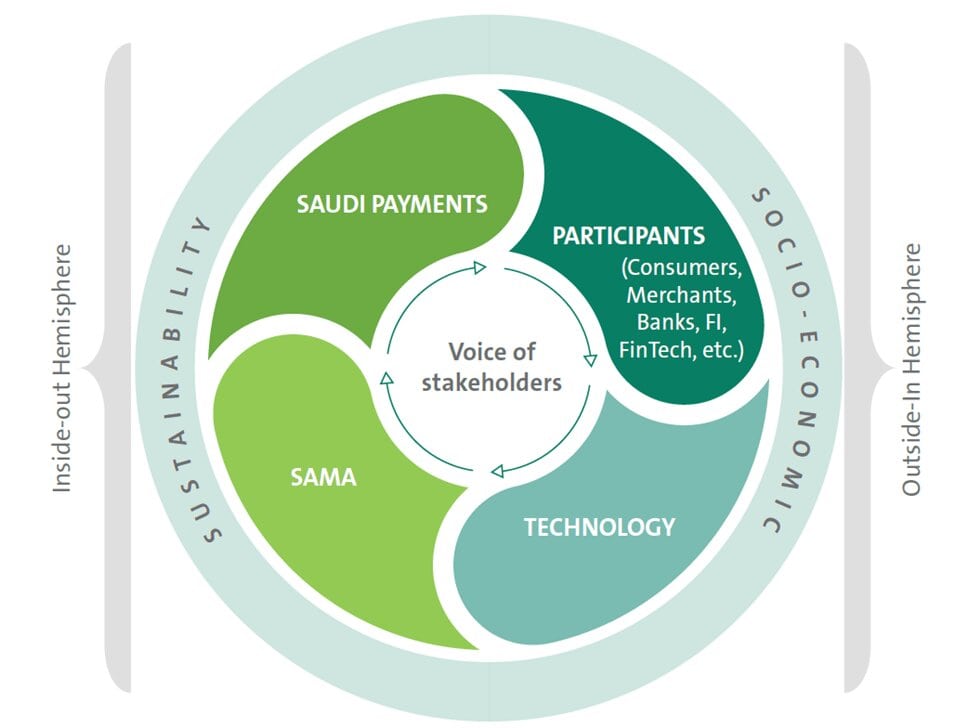 Zoom in
Zoom in
SAMA initiatives towards building a society less dependent on cash
SAMA has taken multiple steps to boost the growth of digital payments in recent years. Its initiatives, projects, and investments aim to improve financial inclusion, enhance payment experience, increase security, and stimulate overall socio-economic growth in Saudi Arabia.
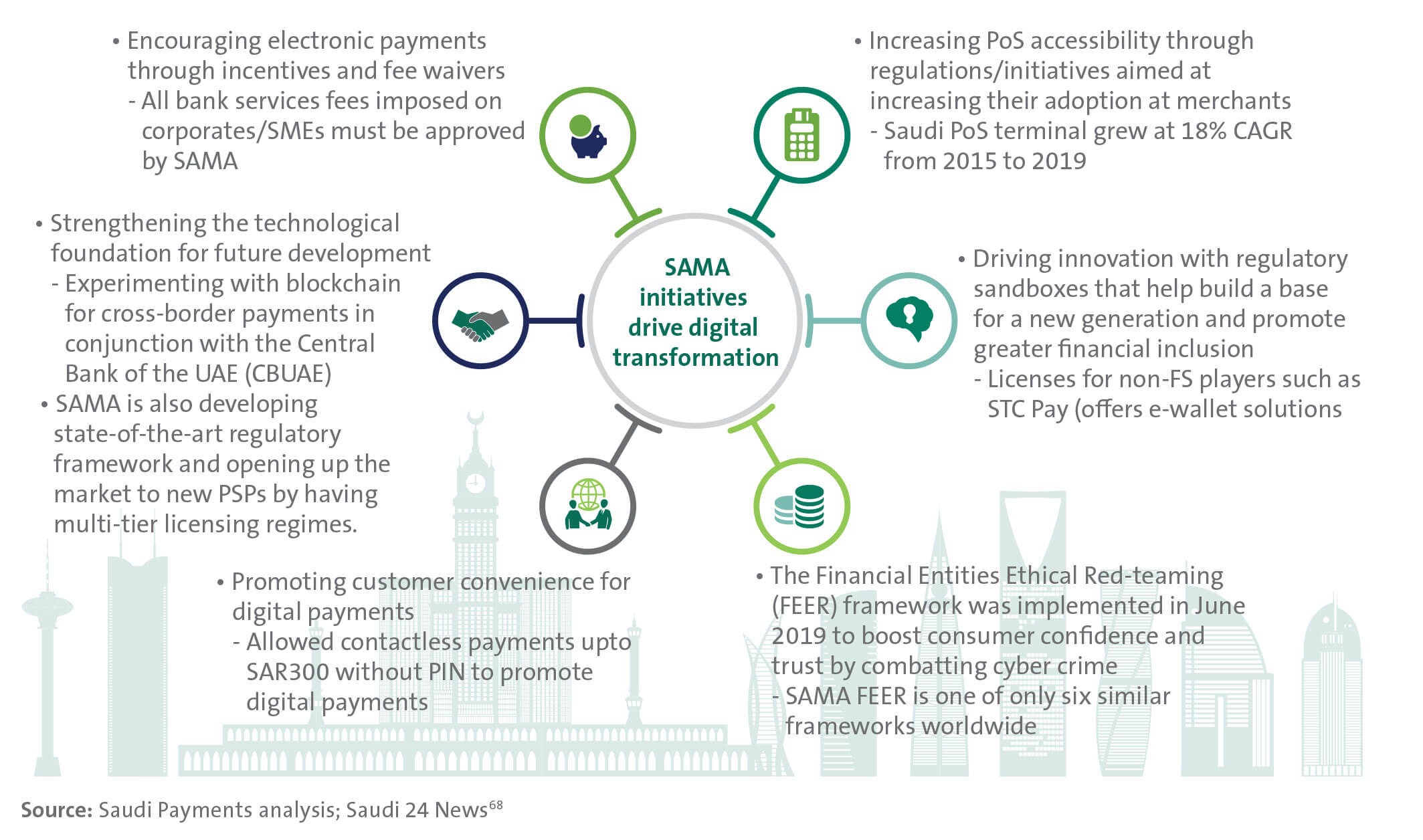 Zoom in
Zoom in
Saudi Payments 2.0: Journey from a utility provider to an ecosystem enabler
Since its inception, Saudi Payments has worked together with multiple industry stakeholders to develop a cohesive national payment system and reliable infrastructure to benefit the whole economy. SAMA steadily rolled out products over the past two decades, and now Saudi Payments operates the back-end infrastructure of four platforms (mada, SADAD, SARIE, and Esal) to create parity among market players.
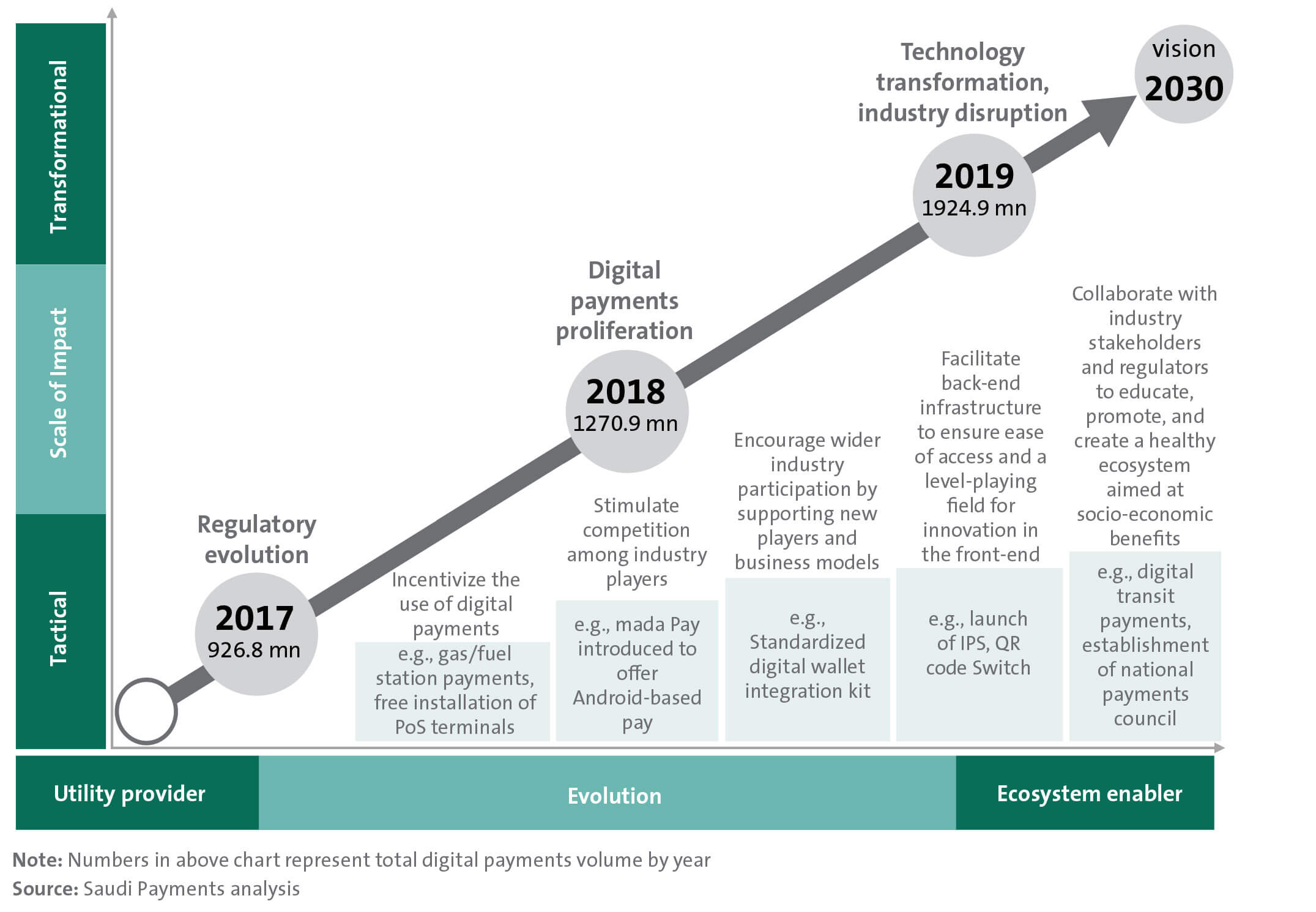 Zoom in
Zoom in
Stakeholder survey shows measures that may help Saudi Payments to accelerate digital payments
Saudi Payments’ initiatives are resonating with industry stakeholders’ expectations. Investment in infrastructure and collaboration among different financial entities emerged as priorities in an industry stakeholder survey by Saudi Payments. Stakeholders also suggested that taking cues from other advanced economies’ best practices may help to promote cashless adoption throughout the KSA.
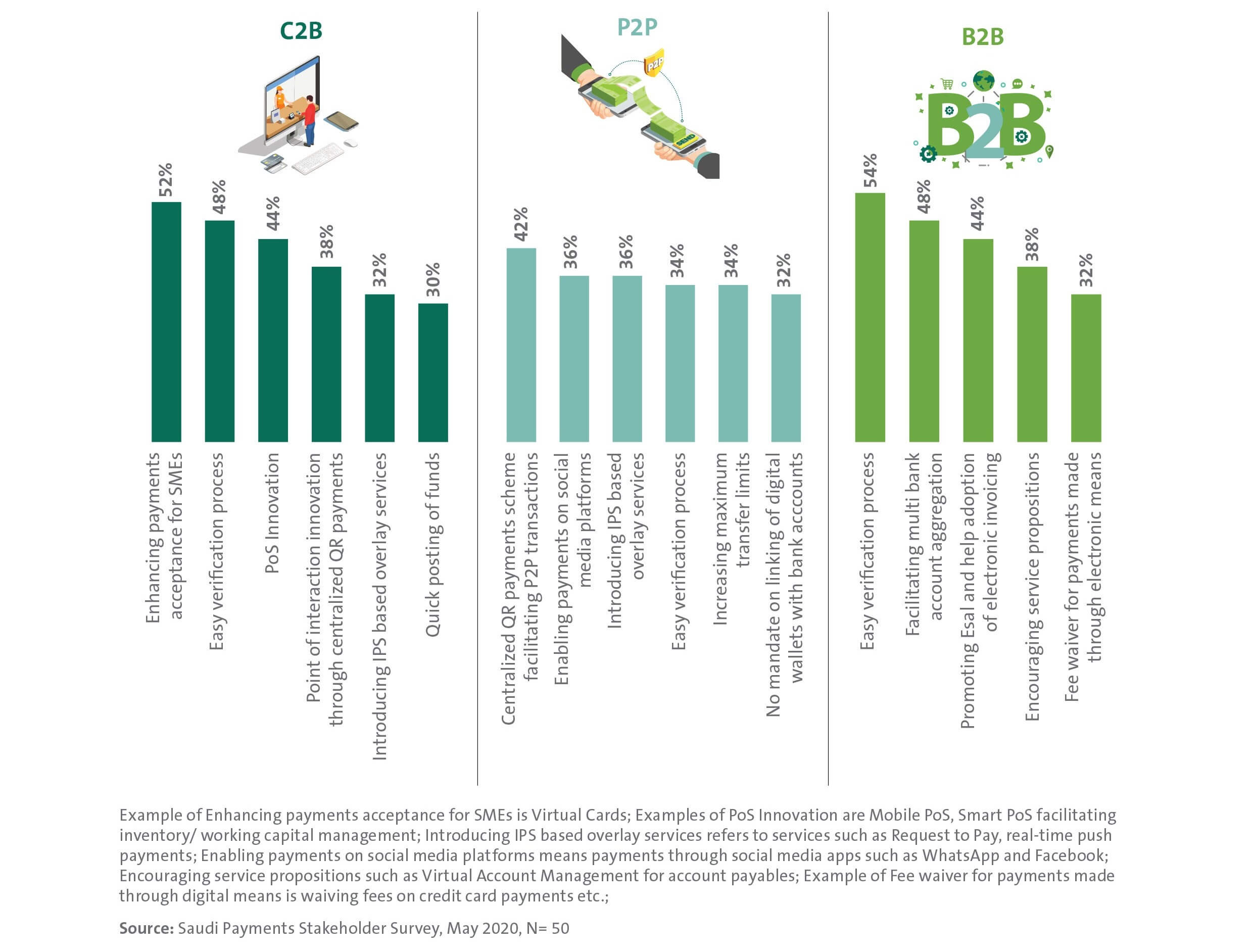 Zoom in
Zoom in
FinTech focus areas: current and future
FinTechs are foreseen to be expanding their offerings / solutions in multiple areas by taking clues from best practices and innovative solutions launched across the globe.
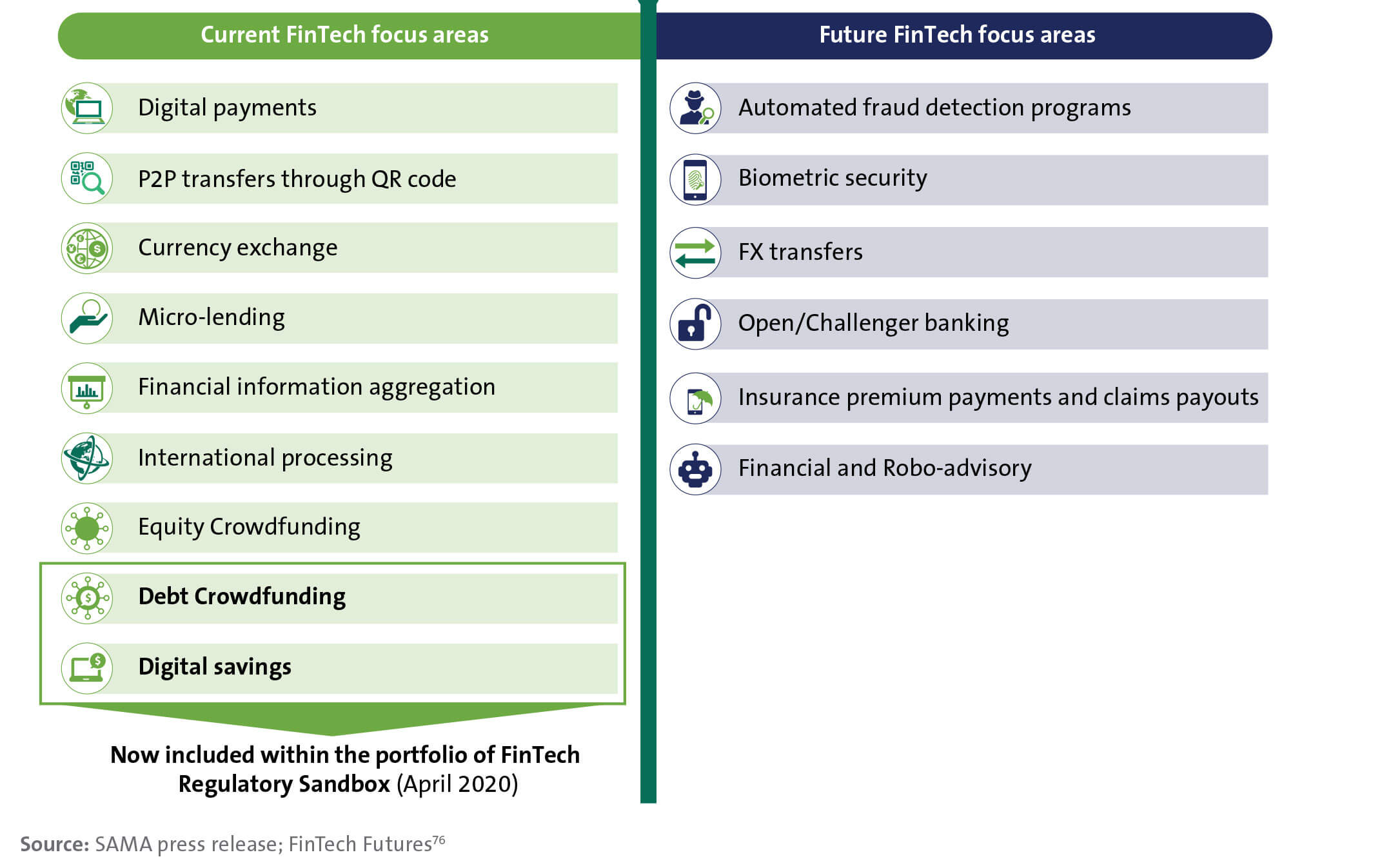 Zoom in
Zoom in
Stakeholder survey shows socio-economic benefits from digital payments development
Few of prominent socio-economic benefits from digital payments' development include increased SMEs contribution to GDP, improved security, and increase in financial literacy rates. It is expected that the development of the digital payments ecosystem will be expedited as the country begins to realize these socio-economic benefits.
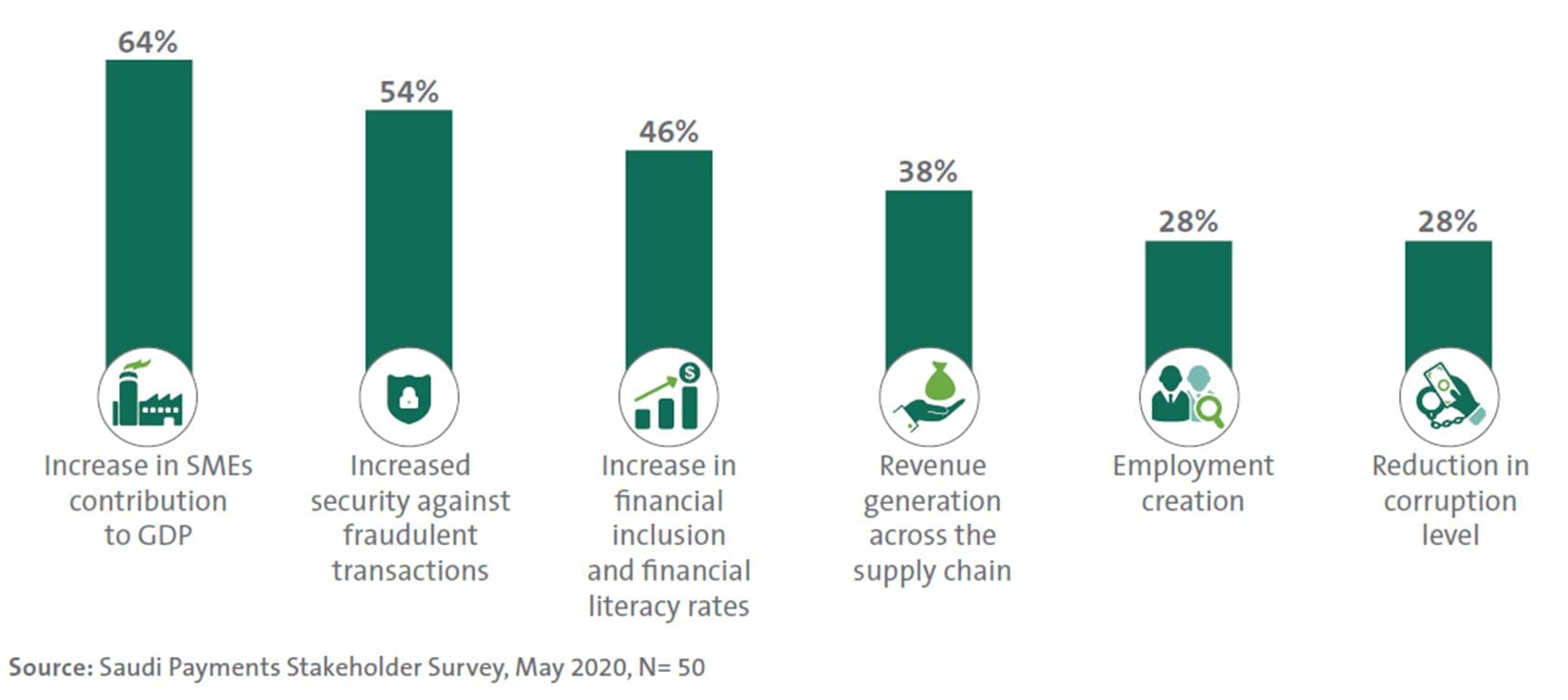 Zoom in
Zoom in
Featured video
Evolving payments landscape in Saudi Arabia
A technologically savvy and youthful society eager to adopt innovative digital payment options offered by Saudi Payments and market stakeholders under the regulations of the Saudi Central Bank (SAMA). Together, SAMA and Saudi Payments are providing secure, interoperable payment platforms to drive innovation on the journey to an economy less reliant on cash. A lookback at the changing payments landscape in the Kingdom of Saudi Arabia and the Payments 2020 report.

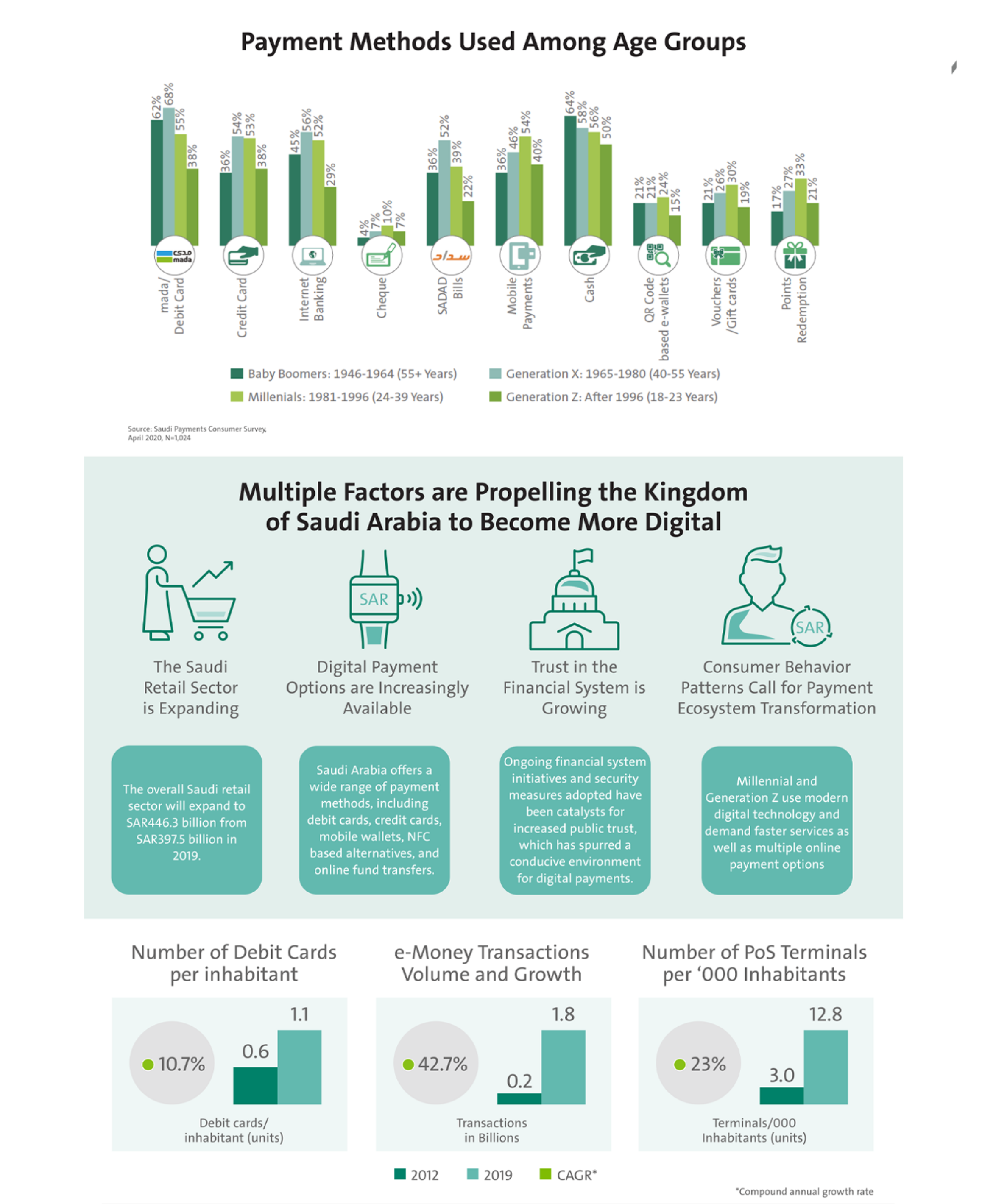
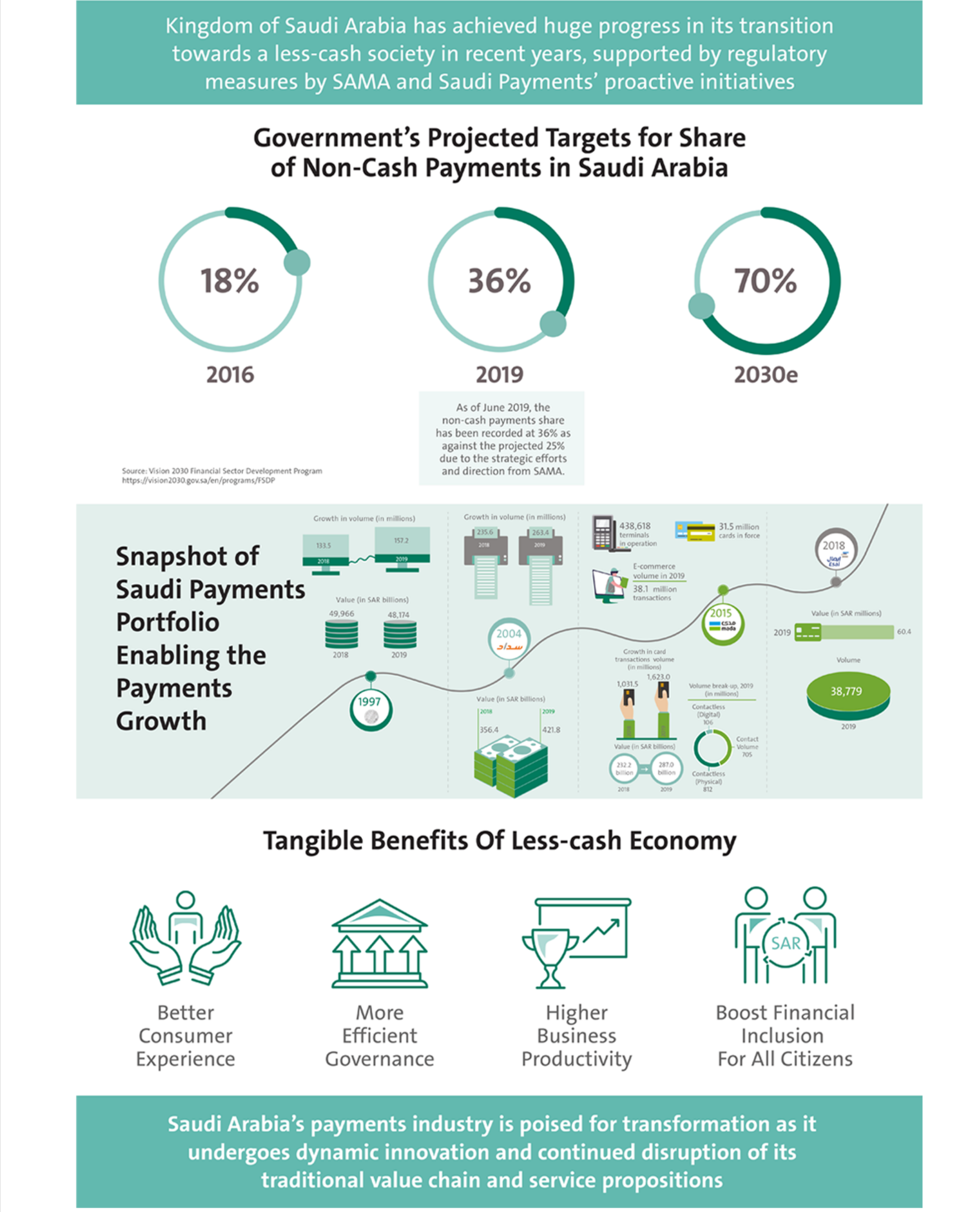
Research Methodology
-
Primary research
-
Secondary research
-
Expert interviews
Primary research
Research Insights were drawn from the three primary sources - a Voice of Consumer (VoC) survey, merchant survey, and a stakeholder or executive survey.
Voice of Consumer Survey: April 2020 The report includes insights from a survey of 1,024 consumers across Saudi Arabia Respondents represented diverse demographics, including region, age, gender, and nationality. An online quantitative survey focused on customer perceptions, preferences, and current and future adoption of payment channels, satisfaction levels, and expectations.
Merchant Survey: May 2020 102 merchants whose business establishments accept cashless payments were polled via online survey. The aim was to capture merchants’ insights around various preferred payment methods for both customers and commercial use, their satisfaction levels, future prospects, and regulatory impact.
Stakeholder Survey: May 2020 50 respondents from organizations directly or indirectly serving the payments industry were surveyed online. Interviewees included bank personnel, digital wallet providers, payment gateway providers, Investors, and FinTech specialists. The survey aimed to understand stakeholders’ perspective regarding initiatives that regulatory and enabling authorities should consider to enhance digital payments acceptance, the role of emerging technologies, and the impact of the overall payment ecosystem on Saudi society and economic development.

Secondary research
Extensive desk research was conducted to synthesize data from various published sources. Data was reviewed from government organizations, industry associations, central banks, international financial organizations, news articles, press releases, market reports and other public domain resources Existing statistical data, policies, regulations, and standards were also analyzed.

Expert interviews
The report features insights from more than 35 business executives representing a range of institutions. In-depth 45-60 minute interview discussions sought to understand executives’ current and future outlook about cashless payments volumes and transactions (C2B, B2B, and B2C), technological evolution and other relevant insights about the Kingdom’s payment sector.

